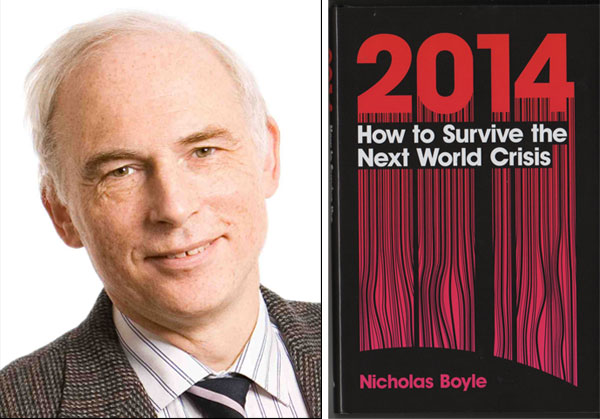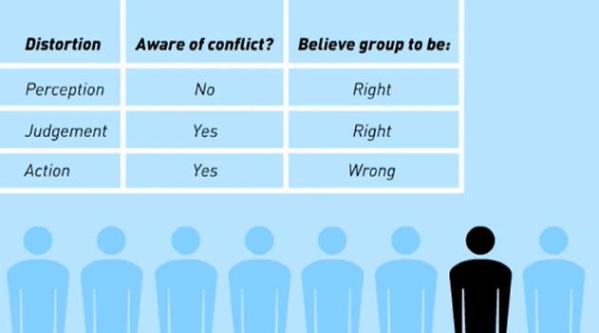


The Asch Experiment: Can Social Influence Distort Your Perception?
We will conform to the group. We’re very social creatures. We’re very much aware of what people around us think. We want to be liked. We don’t want to be seen to rock the boat so we will go along with the group even if we don’t believe what people are saying, we still go along.” * This is a conclusion from what is known as “The Asch Experiment,” an experiment originally conceived in the 1950’s by Social Psychologist Solomon Asch, demonstrated in the video below [2 min.]: The 3 Levels of Distortion As indicated in Martin Shepard’s video about conformity [10 min.], “Asch proposed conformity could be explained by distortions occurring at any of three levels: perception, judgment and action.” At the action level: subjects believe the majority are wrong, but go along with them anyway. At the level of judgment: subjects perceive there is a conflict but reject their own judgment, concluding the majority are right. At the level of perception: subjects’ perceptions are genuinely distorted by the majority’s answers”. “If it’s true that the subjects’ perceptions are genuinely distorted, that means that group opinion has the potential to affect an individual’s information processing on a very profound level.” ** * Source: YouTube/The Asch Experiment **...
The Bystander Effect: Old Experiments Still Relative To Today’s Social Influences
And there you have a group of (effectively) strangers who were exerting the pressure not to intervene, not to help; and it’s very difficult to rebel!” This Bystander Effect is demonstrated in the following video [3 min.]: Using Other People’s Behavior As Clues To Reality There are, in fact, many reasons why bystanders in groups fail to act in emergency situations, but social psychologists have focused most of their attention on two major factors. According to a basic principle of social influence, bystanders monitor the reactions of other people in an emergency situation to see if others think that it is necessary to intervene. Each person uses others’ behavior as clues to reality. Since everyone is doing exactly the same thing (nothing), they all conclude from the inaction of others that help is not needed. This is an example of pluralistic ignorance or social proof. The other major obstacle to intervention is known as diffusion of responsibility. This occurs when observers all assume that someone else is going to intervene and so each individual feels less responsible and refrains from doing anything.” Bystander Effect Extends To Cyberspace The bystander effect also extends beyond reality and into cyberspace. Specifically, in a study performed by Markey (2000), the experiment focused on the amount of time it took a bystander to provide assistance. The researchers examined the effects of the gender of an individual seeking help by measuring participant response time (dependent variable). The perceived gender was manipulated by the usage of a male or female screen name in an Internet chat room (independent variable). The treatment conditions examined the number of...![Is It Time To Look Beyond Capitalism Toward A New Social Order? [RSA Video]](http://www.mutualresponsibility.org/wp-content/uploads/2012/03/capitalism_600px-1.jpg)
Is It Time To Look Beyond Capitalism Toward A New Social Order? [RSA Video]
Is it time to look beyond capitalism towards a new social order that would allow us to live within a system that could be responsible, just and humane?” Professor David Harvey, PhD, researches to figure out the role of crises in the whole history of capitalism and what’s specific and special about the crisis this time around” by looking at “the internal contradictions of capital accumulation.” An Internal Contradiction Of Capital Accumulation Financial profits in the United States were soaring after the 1990s” while “profits in manufacturing were coming down … you can see the imbalance … you’ve screwed industry to keep financiers happy,” and as a result “the wealth of the rich … has accelerated.” How Did This Happen? Since the 1970s, we have been in a phase that we call wage repression.” If you diminish wages, where is your demand going to come from?” The answer was, well … get out your credit cards.” Capitalism Never Solves Its Crises Problems, It Moves Them Around Geographically Out of this comes a theory which is very, very important: that capitalism never solves its crises problems, it moves them around geographically.” In other words, you had a finance crisis … you sort of half solved that, but … at the expense of a sovereign debt...![Can Your Actions And Thoughts Influence People You Don’t Know? Prof. Fowler Explains [PopTech Video]](http://www.mutualresponsibility.org/wp-content/uploads/2012/09/james-fowler.jpg)
